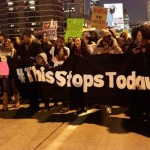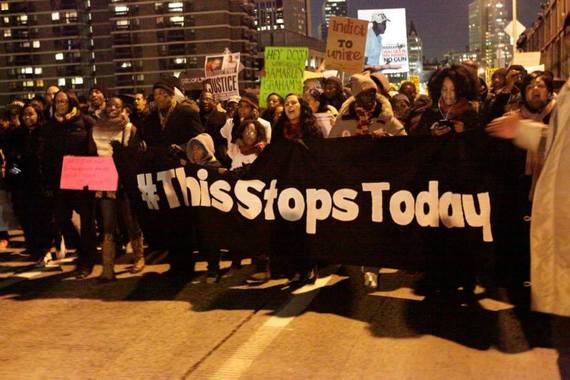
More than 50,000 people marched in New York City Saturday — with untold thousands of others joining across the country — to protest the killings of Eric Garner, Michael Brown and many other young men and women of color, while officers got away scot-free. Less than 24 hours before, Senator Elizabeth Warren took the Senate floor and gave what may be the most significant speech of her career, railing against the Wall Street giveaways in the weekend’s spending bill and the big banks’ outsize influence in Washington: And now we’re watching as Congress passes yet another provision that was written by lobbyists for the biggest recipient of bailout money in the history of this country. And it’s attached to a bill that needs to pass or else…
More than 50,000 people marched in New York City Saturday — with untold thousands of others joining across the country — to protest the killings of Eric Garner, Michael Brown and many other young men and women of color, while officers got away scot-free.
Less than 24 hours before, Senator Elizabeth Warren took the Senate floor and gave what may be the most significant speech of her career, railing against the Wall Street giveaways in the weekend’s spending bill and the big banks’ outsize influence in Washington:
And now we’re watching as Congress passes yet another provision that was written by lobbyists for the biggest recipient of bailout money in the history of this country. And it’s attached to a bill that needs to pass or else the entire federal government will grind to a halt.
Think about that kind of power. If a financial institution has become so big and so powerful that it can hold the entire country hostage.
In many ways the anger that caused thousands to take the streets on Saturday against a criminal justice system that devalues the lives of people of color in this country is the same anger against a political system that prioritizes the banks, the rich and the powerful over families, which Senator Warren encapsulated in her speech.

There is a growing protest movement in this country fueled by a sense of isolation and desperation from a system that keeps families in despair and has a different set of rules for those in power than for those who are not. The justice system that refused to try the officers involved in the deaths of Eric Garner and Michael Brown is the same justice system that refused to jail the bankers responsible for the financial crisis.
Americans remain skeptical of judicial and political systems that are stacked against them. Confidence in all levels of government is at an all-time low, while societal shifting protests are on the rise. From the #BlackLivesMatter movement to the #OccupyWallStreet movement to the #Fightfor15 movement, Americans (especially young Americans) have risen up against a system of inequality in ways that are reminiscent of the 1960’s civil rights and Vietnam War movements.
The rage Senator Warren expresses is the same rage of millions who have joined the #BlackLivesMatter movement and others like it in this country. Until we can restore confidence in government and truly hold those responsible for the crimes they commit, the movements will continue to grow. The question remains whether Hillary Clinton and the old guard of Democrats are ready to embrace these movements or whether these movements will surpass them and create a new branch of Democrats aligned with the broader anger we are seeing in the streets.
View article:
What Elizabeth Warren and the #BlackLivesMatter Movement Have in Common





























